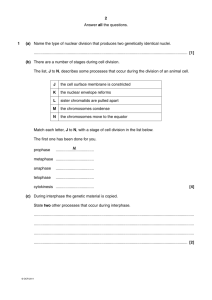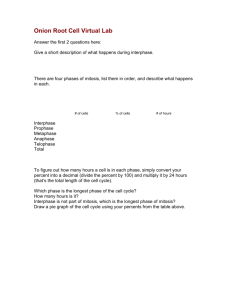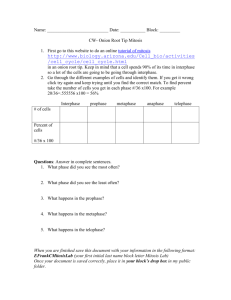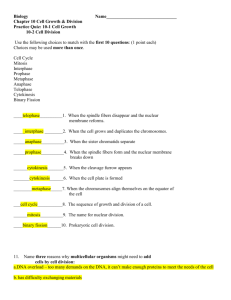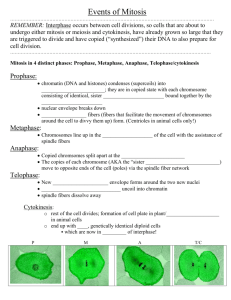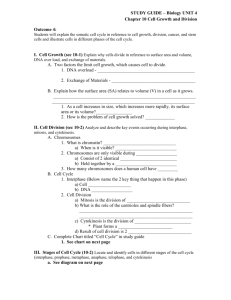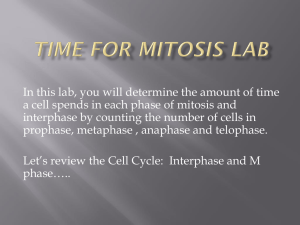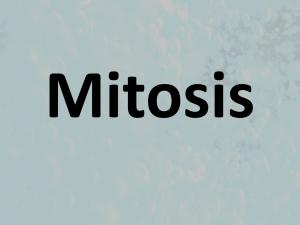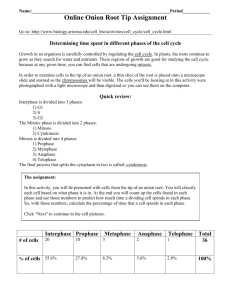Mitosis and Mieosis Review Word
advertisement
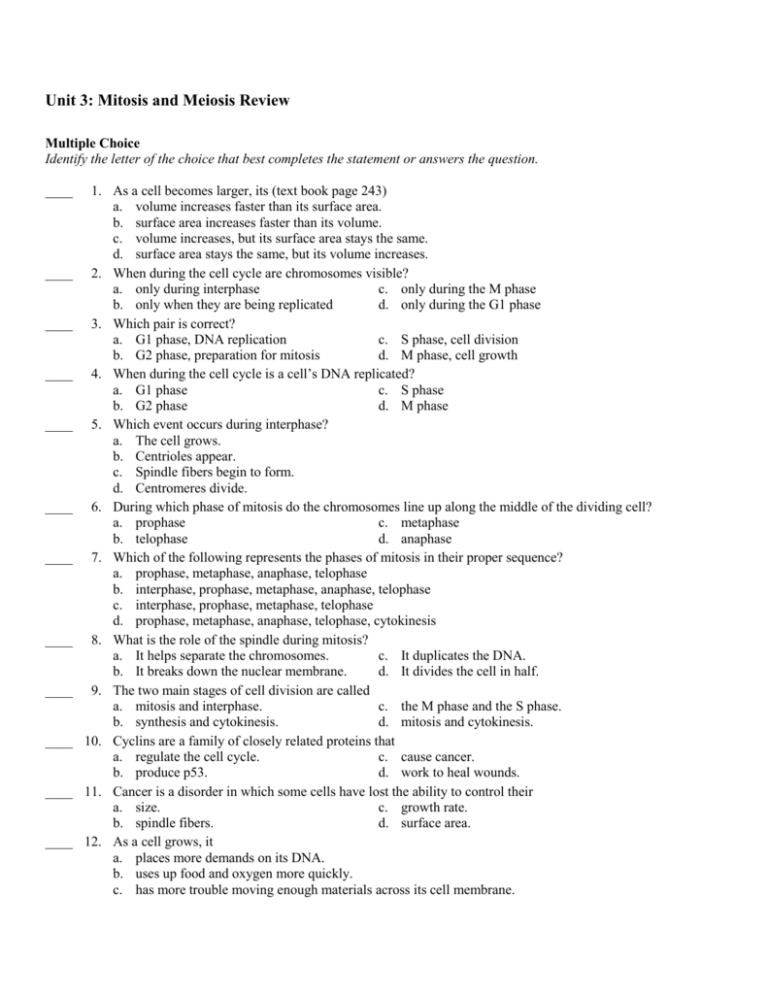
Unit 3: Mitosis and Meiosis Review Multiple Choice Identify the letter of the choice that best completes the statement or answers the question. ____ ____ ____ ____ ____ ____ ____ ____ ____ ____ ____ ____ 1. As a cell becomes larger, its (text book page 243) a. volume increases faster than its surface area. b. surface area increases faster than its volume. c. volume increases, but its surface area stays the same. d. surface area stays the same, but its volume increases. 2. When during the cell cycle are chromosomes visible? a. only during interphase c. only during the M phase b. only when they are being replicated d. only during the G1 phase 3. Which pair is correct? a. G1 phase, DNA replication c. S phase, cell division b. G2 phase, preparation for mitosis d. M phase, cell growth 4. When during the cell cycle is a cell’s DNA replicated? a. G1 phase c. S phase b. G2 phase d. M phase 5. Which event occurs during interphase? a. The cell grows. b. Centrioles appear. c. Spindle fibers begin to form. d. Centromeres divide. 6. During which phase of mitosis do the chromosomes line up along the middle of the dividing cell? a. prophase c. metaphase b. telophase d. anaphase 7. Which of the following represents the phases of mitosis in their proper sequence? a. prophase, metaphase, anaphase, telophase b. interphase, prophase, metaphase, anaphase, telophase c. interphase, prophase, metaphase, telophase d. prophase, metaphase, anaphase, telophase, cytokinesis 8. What is the role of the spindle during mitosis? a. It helps separate the chromosomes. c. It duplicates the DNA. b. It breaks down the nuclear membrane. d. It divides the cell in half. 9. The two main stages of cell division are called a. mitosis and interphase. c. the M phase and the S phase. b. synthesis and cytokinesis. d. mitosis and cytokinesis. 10. Cyclins are a family of closely related proteins that a. regulate the cell cycle. c. cause cancer. b. produce p53. d. work to heal wounds. 11. Cancer is a disorder in which some cells have lost the ability to control their a. size. c. growth rate. b. spindle fibers. d. surface area. 12. As a cell grows, it a. places more demands on its DNA. b. uses up food and oxygen more quickly. c. has more trouble moving enough materials across its cell membrane. d. all of the above ____ 13. The process by which a cell divides into two daughter cells is called a. cell division. c. interphase. b. metaphase. d. mitosis. ____ 14. Which of the following happens when a cell divides? a. The cell’s volume increases. b. It becomes more difficult for the cell to get enough oxygen and nutrients. c. The cell has DNA overload. d. Each daughter cell receives its own copy of the parent cell’s DNA. ____ 15. Which of the following is a phase in the cell cycle? a. G1 phase c. M phase b. G2 phase d. all of the above Figure 10–2 ____ 16. Cell division is represented in Figure 10-2 by the letter? a. A. c. C. b. B. d. D ____ 17. The cell cycle is the a. series of events that cells go through as they grow and divide. b. period of time between the birth and the death of a cell. c. time from prophase until cytokinesis. d. time it takes for one cell to undergo mitosis. Figure 10–3 ____ 18. The structure labeled A in Figure 10-3 is called the ____ 19. ____ 20. ____ 21. ____ 22. a. centromere. c. sister chromatid. b. centriole. d. spindle. The structures labeled B in Figure 10-3 are called a. centromeres. c. sister chromatids. b. centrioles. d. spindles. Which of the following is a phase of mitosis? a. cytokinesis c. anaphase b. interphase d. S phase The first phase of mitosis is called a. prophase. c. metaphase. b. anaphase. d. interphase. What is a tumor? a. an accumulation of cyclins b. a mass of cancer cells c. the rapidly dividing cells found at the site of a wound d. a defective p53 gene Completion Complete each sentence or statement. 23. The larger a cell becomes, the ____________________ efficiently it is able to function. 24. Before a normal cell becomes too large to carry out normal activities, it will usually divide to form two ____________________ cells. 25. In all forms of ____________________, certain cells fail to respond to the signals that regulate the cell cycle of most cells. 26. The process by which a cell divides into two daughter cells is called ____________________. 27. Together, the G1 phase, S phase, and G2 phase are called ____________________. 28. Look at Figure 10-4. The process shown occurs directly following mitosis. This process is called ____________________. Figure 10–4 Short Answer 29. What is interphase, and which phases of the cell cycle does interphase include? 30. Describe how a plant cell produces a new cell wall during cytokinesis. 31. Identify a factor that can stop cells from growing. Give an example of how this factor affects cell growth. 32. Why are chromosomes not visible in most cells except during cell division? Figure 10–2 33. The main events of the cell cycle are labeled A, B, C, and D in Figure 10-2. Name these events. Then, briefly state what happens during each event. 34. How do cancer cells differ from normal cells? REF: p. 252
